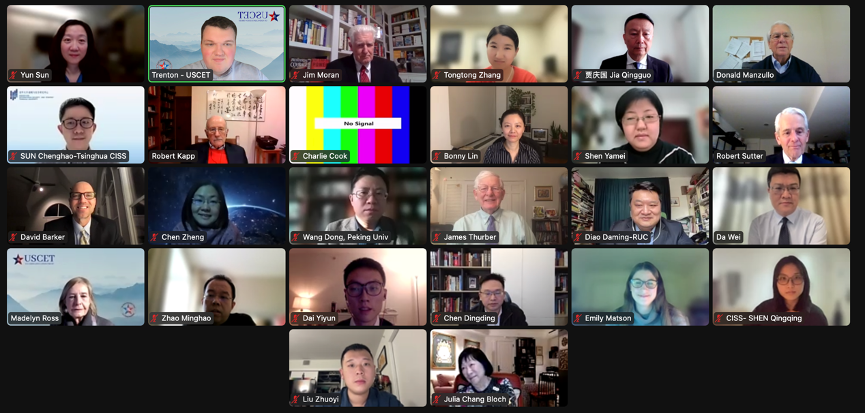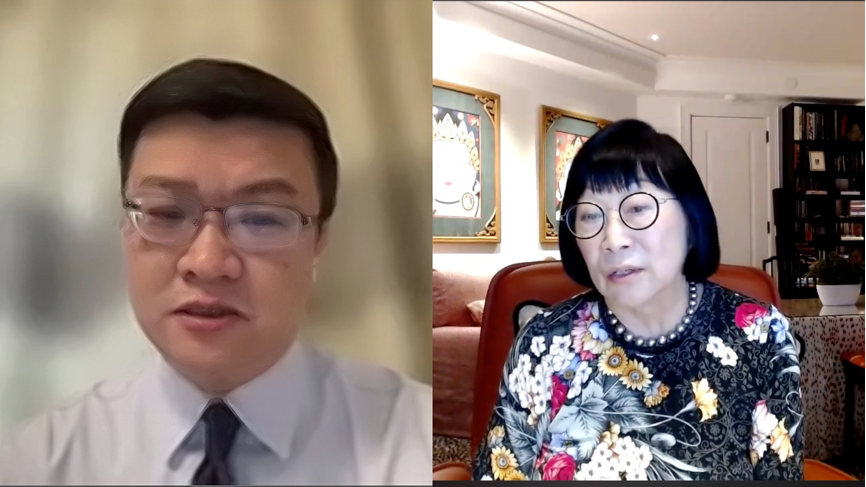On January 11, the Center for International Security and Strategy (CISS) at Tsinghua University and the US-China Education Trust (USCET) jointly held a webinar themed “A Divided Congress: Implications for China-US Relations and the Road to 2024.”

Opening remarks were delivered by CISS Director Da Wei and USCET President Ambassador Julia Chang Bloch. Professor Da then moderated three keynote sessions titled “Post-Midterms Analysis,” “The US Congress and China-US Strategic Competition,” and “The Road to 2024.” Among the American panelists were James Thurber, university distinguished professor of government emeritus and founder and former director of the Center for Congressional and Presidential Studies, American University; Don Manzullo, former Republican congressman; Jim Moran, former Democratic congressman; Charlie Cook, leading political analyst and founder of The Cook Political Report. The event also featured Chinese experts including Diao Daming, CISS expert and associate professor at Renmin University of China; Jia Qingguo, professor at the School of International Studies, Peking University; and Xie Tao, professor and dean of the School of International Relations and Diplomacy, Beijing Foreign Studies University.

Da Wei (left) and Julia Chang Bloch (right)
Robert Sutter, professor at George Washington University, moderated the discussion, which featured Sun Chenghao, CISS fellow; Zhao Minghao, CISS expert and research fellow at the Institute of International Studies, Fudan University; Wang Dong, professor at the School of International Studies, Peking University; Shen Yamei, director of the Department for American Studies, China Institute of International Studies; Chen Dingding, professor at the School of International Studies, Jinan University; Chen Zheng, lecturer at the Academy of Regional and Global Governance, Beijing Foreign Studies University; David Barker, professor of government and director of the Center for Congressional and Presidential Studies, American University; Robert Kapp, former president of the US-China Business Council; Bonny Lin, director of the China Power Project, Center for Strategic and International Studies; Yun Sun, director of the China Program, Stimson Center; and Tongtong Zhang, postdoctoral scholar at Stanford University, among others.
According to the panelists, the results of the midterm elections portend the continuation of the polarization in American politics, which features growing tribalism within political parties and increasingly extreme partisan divisions, with a convergence of views on China between the two parties nonetheless. Both parties will continue to use their policies to win the working class; but when there is a need for Congress to deliver, the House Republicans may find themselves in an internal stalemate.
Experts believe that an increasingly assertive US Congress and its confrontational role in the strategic competition between the US and China have exacerbated tensions and confrontations between the two countries, especially in trade and technology. The Congress’ push to reshape the global supply chain system and reset previously China-dependent supply chains on US soil through relevant review mechanisms and legislation has further undermined the bilateral ties.
Going forward, the twofold polarization in US politics will continue to pose challenges to both parties and within them—we will not only see a widening partisan divide, but also tribalism and generational challenges within both parties, signaling great uncertainty for the 2024 election.
Panelists on both sides agreed that although this is a tough time for the China-US relationship, mutual dialogue and communication, which is essential for its stability, should still be maintained.
